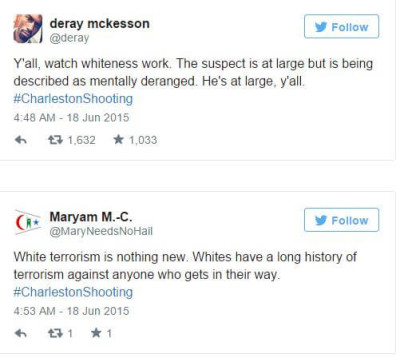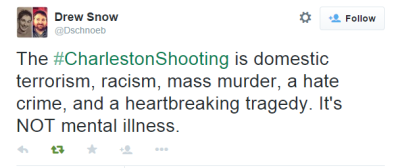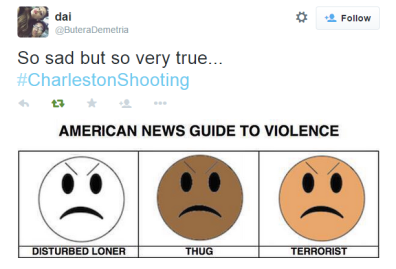Final Blog: Examining the Death Penalty’s Effectiveness, Morality, and Constitutionality
jacinda.allen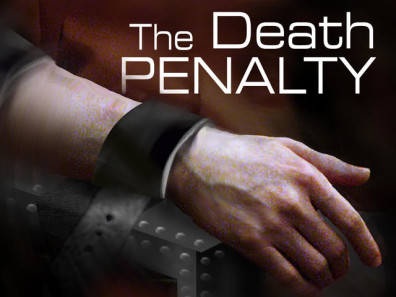 http://www.lawenforcementtoday.com/2012/12/13/is-there-a-death-penalty-in-america/
http://www.lawenforcementtoday.com/2012/12/13/is-there-a-death-penalty-in-america/
The death penalty is an extremely controversial issue all over the world, but especially in the United States. Though more than half of Americans surveyed said that they supported the death penalty in 2013, support for it is continuing to decline over the years (Saad, 2013). The Supreme Court has continuously ruled that the death penalty is constitutional and should continue to be in use (Mott, 2015), despite the large amount of research showing it’s ineffectiveness. Aside from the death penalty simply not being an effective method to deter crime, it’s immoral for our own justice system to purposefully take human lives. Unfortunately, until society’s interpretation of the constitution changes or enough people stop supporting the death penalty, it will continue to be used as a way to deter crime and punish capital criminals, even if it doesn’t work well at all.
You’d think with the large amount of support that the death penalty has, it would also significantly help in stopping capital crimes. Clearly, however, the general public is uninformed and is basing their decisions on the death penalty off of false perceptions and facts. One study surveyed many top criminologists on whether or not they believed the evidence around the death penalty showed that it deterred capital crime, and they all agreed that it did not (Radelet, 2010). If the experts’ opinion isn’t enough for you, then maybe statistics can show this. For more than 20 years, states that use the death penalty have actually had a higher rate of murder than states that do not use the death penalty (Deterrence, 2015). In 2013, the murder rate for states that used the death penalty was 4.72%, and the murder rate for states that did not use the death penalty was 3.88% (Deterrence, 2015). So, not only does the death penalty not have a significant effect in deterring capital crime, it seems that it may have a reverse effect and make capital crime worse (Deterrence, 2015). Here’s a graph showing the murder rates in states with and without the death penalty over the last few years:
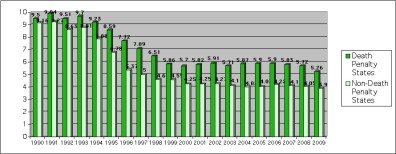 http://www.deathpenaltyinfo.org/deterrence-states-without-death-penalty-have-had-consistently-lower-murder-rates
http://www.deathpenaltyinfo.org/deterrence-states-without-death-penalty-have-had-consistently-lower-murder-rates
Unfortunately, for the death penalty to really deter criminals from committing murder, offenders would need to really think through the crime they were going to commit and carefully weigh all of the costs and benefits (Donohue, 2009). Another study showed that offenders typically think a lot more about the rewards of committing crime than the costs, and even when they do think about the costs, they think more short term (getting arrested) than they do long term (getting the death penalty) (Donohue, 2009). Aside from the death penalty being simply ineffective, it’s also immoral.
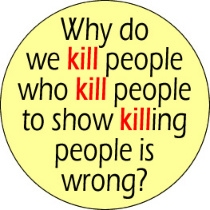 https://eng24kbcc2015.files.wordpress.com/2015/05/against-death-penalty.jpg
https://eng24kbcc2015.files.wordpress.com/2015/05/against-death-penalty.jpg
This picture makes a great point. How does it make sense to try and stop murder by murdering someone who murders? If we can all agree that murder is wrong and immoral, than we should all be able to agree that it is equally wrong and immoral to take another human being’s life as punishment. Some people argue that the death penalty is the only punishment that’s proportional to capital crime, but life long prison sentences without parole may be enough (Kohlberg, 2010). This way, the offender can think about what they’ve done their whole life (Kohlberg, 2010). Giving them the death penalty would simply end their suffering and punishment, and would really only punish their loved ones and society who got to see the state kill another human being (Kohlberg, 2010). And think about this: what if, in the off chance, the person getting the death penalty was innocent? A recent study found that 4% of people on death row are innocent (Gross, 2014). Some of these people are proven innocent and released, but some are not, and it’s not like the death penalty is reversible (Gross, 2014). Even if our justice system is 99% sure that a person is guilty of a capital crime, they can never be entirely sure (Gross, 2014). Is the death penalty really worth it with that small possibility of innocence? I don’t think so. Nobody should have to die at the hands of the state, regardless of their actions. Even with the death penalty’s ineffectiveness and immorality, the Supreme Court has ruled it constitutional time and time again, and this is why it still continues today.
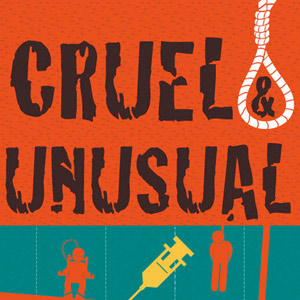 http://www.google.com/search?q=death+penalty&espv=2&biw=905&bih=789&site=webhp&source=lnms&tbm=isch&sa=X&ved=0ahUKEwjr0en61N_JAhUQ_mMKHSvqDxgQ_AUIBygC&dpr=0.75#tbm=isch&q=the+eighth+amendment&imgrc=HbUOFttI1k4fpM%3A
http://www.google.com/search?q=death+penalty&espv=2&biw=905&bih=789&site=webhp&source=lnms&tbm=isch&sa=X&ved=0ahUKEwjr0en61N_JAhUQ_mMKHSvqDxgQ_AUIBygC&dpr=0.75#tbm=isch&q=the+eighth+amendment&imgrc=HbUOFttI1k4fpM%3A
The Eighth Amendment states that no punishment for crime can be too “cruel” or “unusual,” and the death penalty has never been deemed either of these things (Mott, 2015). Some people have questioned whether or not it is somewhat unusual in the way that it’s administered since a disproportionate number of minorities are given the death penalty (Kohlberg, 2010). However, since the death penalty is technically a proportional punishment for capital crime, the majority of people don’t seem to think that it’s too “cruel” or “unusual.” Additionally, the Fifth Amendment says that we all have the right to life (and a few other things), but there is a statement that specifically addresses capital crime, saying that nobody can be deprived of life by the state without due process of the law (Richardson, 2013). Some people argue that if the Founding Fathers were against the death penalty, why would they need to include a clause that implies that a person could be deprived of life by the state, as long as there was due process of the law (Richardson, 2013)? As it stands today, our society is interpreting the constitution in a way that says that the death penalty is okay (Mott, 2015). If we were to change our views on what is “cruel” and “unusual,” or interpret the Fifth Amendment in a different way, the death penalty may not be allowed anymore (Mott, 2015).
Overall, the death penalty is extremely ineffective and may actually have a reverse effect on deterring capital crime. It’s also immoral for the state to take another human being’s life, but unfortunately the death penalty is constitutional and will continue to be seen this way unless society changes the way we interpret and understand the constitution.
References:
Deterrence: States without the death penalty have had consistently lower murder rates. (2015). Retrieved December 14, 2015, from http://www.deathpenaltyinfo.org/deterrence-states-without-death-penalty-have-had-consistently-lower-murder-rates
Donohue, J. (2009). The impact of the death penalty on murder. Criminology & Public Policy, 8(4), 795-801. Retrieved December 10, 2015, from EBSCO.
Gross, S., O’brien, B., Hu, C., & Kennedy, E. (2014). Rate of false conviction of criminal defendants who are sentenced to death. Proceedings of the National Academy of Sciences, 7230-7235. Retrieved December 10, 2015, from http://www.pnas.org/content/111/20/7230.full.pdf
Kohlberg, L., & Elfenbein, D. (2010). The development of moral judgements concerning capital punishment. American Journal of Orthopychiatry, 45(4); 614-640. Retrieved December 14, 2015, from Wiley Online Library.
Mott, J. (2015). Is the death penalty constitutional? Retrieved December 14, 2015, from http://www.thisnation.com/question/018.html
Radelet, M., & Lacock, T. (2009). Do executions lower homicide rates?: The views of leading criminologists. The Journal of Criminal Law and Criminology, 99(2). Retrieved December 10, 2015, from ProQuest.
Richardson, W. (2013). Is the death penalty unconstitutional? Retrieved December 14, 2015, from http://deathpenalty.procon.org/view.resource.php?resourceID=1715#1a
Saad, L. (2013, January 9). U.S. death penalty support stable at 63%. Retrieved December 14, 2015, from http://www.gallup.com/poll/159770/death-penalty-support-stable.aspx

